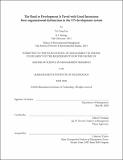| dc.contributor.advisor | John D. Sterman. | en_US |
| dc.contributor.author | Lim, Tse Yang(Scientist in business management studies)Massachusetts Institute of Technology. | en_US |
| dc.contributor.other | Sloan School of Management. | en_US |
| dc.date.accessioned | 2020-09-03T16:45:49Z | |
| dc.date.available | 2020-09-03T16:45:49Z | |
| dc.date.copyright | 2020 | en_US |
| dc.date.issued | 2020 | en_US |
| dc.identifier.uri | https://hdl.handle.net/1721.1/126967 | |
| dc.description | Thesis: S.M. in Management Research, Massachusetts Institute of Technology, Sloan School of Management, May, 2020 | en_US |
| dc.description | Cataloged from the official PDF of thesis. | en_US |
| dc.description | Includes bibliographical references (pages 27-29). | en_US |
| dc.description.abstract | The ability of multiple organizations to effectively collaborate in pursuit of shared goals is important across many fields, but perhaps nowhere more so than in sustainable development. Advancing sustainable development requires addressing numerous highly interconnected issues across multiple sectors. The interconnections present not only a substantive challenge, but an organizational one as well. Despite widespread agreement on the need for more integrative approaches and strong motivations to implement them, many organizations working on different aspects of sustainable development persistently fail to integrate their work effectively. I examine the puzzle of persistent integration failure in the context of the UN development system (UNDS), which plays an important normative and operational role in guiding development efforts worldwide. Using causal loop diagrams informed by field observations and expert interviews, I present a dynamic explanation of the relationships between various parts of the UNDS and the challenges of coordinating work on sustainable development. I demonstrate how intendedly rational attempts to improve efficiency and performance by UN agencies and the countries that control them inadvertently set off self-reinforcing processes that drive persistent fragmentation and integration failure. Unless these dynamics are accounted for, ongoing attempts to improve integration in the system are likely to fail. | en_US |
| dc.description.statementofresponsibility | by Tse Yang Lim. | en_US |
| dc.format.extent | 29 pages | en_US |
| dc.language.iso | eng | en_US |
| dc.publisher | Massachusetts Institute of Technology | en_US |
| dc.rights | MIT theses may be protected by copyright. Please reuse MIT thesis content according to the MIT Libraries Permissions Policy, which is available through the URL provided. | en_US |
| dc.rights.uri | http://dspace.mit.edu/handle/1721.1/7582 | en_US |
| dc.subject | Sloan School of Management. | en_US |
| dc.title | The road to development is paved with good intentions : inter-organizational dysfunction in the UN development system | en_US |
| dc.type | Thesis | en_US |
| dc.description.degree | S.M. in Management Research | en_US |
| dc.contributor.department | Sloan School of Management | en_US |
| dc.identifier.oclc | 1191221672 | en_US |
| dc.description.collection | S.M.inManagementResearch Massachusetts Institute of Technology, Sloan School of Management | en_US |
| dspace.imported | 2020-09-03T16:45:48Z | en_US |
| mit.thesis.degree | Master | en_US |
| mit.thesis.department | Sloan | en_US |
